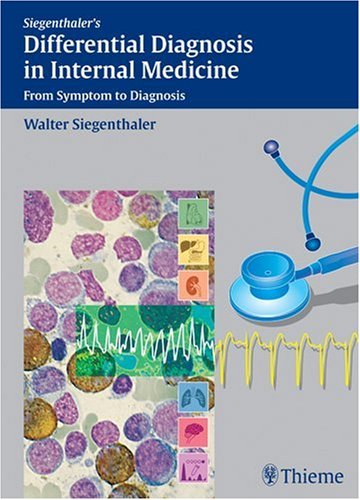Differential Diagnosis in Internal Medicine: From Symptom to Diagnosis download
Par springfield brian le mercredi, juillet 5 2017, 09:38 - Lien permanent
Differential Diagnosis in Internal Medicine: From Symptom to Diagnosis by Walter Siegenthaler


Differential Diagnosis in Internal Medicine: From Symptom to Diagnosis Walter Siegenthaler ebook
Page: 1143
Publisher:
Format: pdf
ISBN: 1588905519, 9781588905512
The NP thought the symptoms could have a metabolic etiology and ordered an MRI and EEG plus blood folate, vitamin B12, vitamin D, and homocysteine levels. All bariatric surgery, neurology, and internal medicine experts opined that failing to diagnose WE in a post–gastric bypass patient, with hyperemesis, who displayed the classic signs of confusion, nystagmus, and ataxia with an MRI abnormality in the There was failure to establish a differential diagnosis. DiagnosisPro is a free, accurate and time saving differential diagnosis tool that reminds you instantly of diagnostic possibilities and minimizes medical errors. BDivision of Internal Medicine, Arcispedale Santa Maria Nuova, Reggio Emilia, Italy .. The classic symptom triad described by Myntner in 1881 of fever, abdominal or flank pain, and limp is present in less than 8 percent of cases. Differential diagnosis may include retrocecal appendicitis, bacterial infection or avascular necrosis of the hip, renal colic and pyelonephritis, arthritis, hip joint infection, S1 disc herniation, inflammatory bowel disease, epidural abscess, vertebral osteomyelitis, pelvic inflammatory Psoas abscess: a primer for the internist. Throughout the 12 months after surgery, the patient remained free of symptoms and all nasal endoscopy examinations were normal. Although isolated nasal involvement of sarcoidosis is rare, otorhinolaryngologists should consider this condition in a differential diagnosis for sinonasal complaints. Consults were done in the departments of internal medicine, pulmonology and ophtalmology. Do they correspond with the symptoms in question? A non-medical friend had suggested I might have an “inner ear infection,” which sounded fair enough — those can apparently cause crazy dizziness and fatigue. How can the preliminary diagnosis be confirmed?